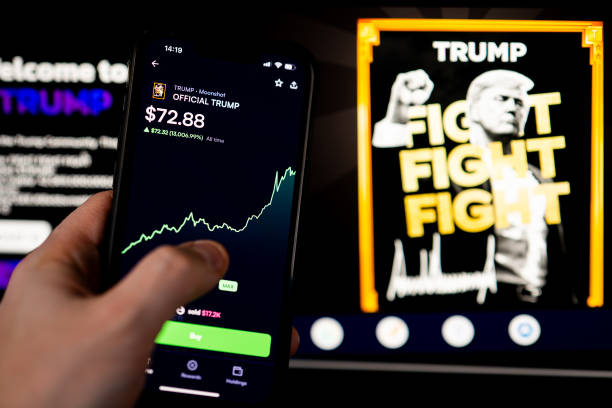Bitcoin is bracing for the US presidential inauguration as traders prepare for volatility.
- Rangebound BTC/USD is tipped to deliver some surprises around the Jan. 20 inauguration, with key levels standing out.
- The week will see multiple core inflation prints as the Federal Reserve takes multiple interest rate cuts off the table.
- The Fed also faces a struggle to contain US dollar strength — a crypto headwind now at its highest since late 2022.
- Binance’s take buy/sell ratio shows signs that Bitcoin may become a firmer “bid” this month.
- Exchange inflows are cooling, with traders choosing to hodl Bitcoin (BTC) in the mid-$90,000 zone.
Bitcoin still risks breaking below $90,000
Bitcoin remains firmly rangebound as a new week begins, with potential volatility triggers reserved for later.
BTC/USD 1-hour chart. Source: Cointelegraph/TradingView
After a spike to near $96,000 around the weekly close, BTC/USD quickly returned to familiar ground of about $93,000, data from Cointelegraph Markets Pro and TradingView shows.
Considering what could impact the short-term BTC price trend, popular trader CrypNuevo identified two key levels.
“In terms of LTF liquidations, we can see it in two different zones: • $91k: sweep of range lows • $97k - $96.3k: nearby liquidations which can be the easiest target right now. We can also see $96.6k as the main liquidation level,” he said in a post on X.
Binance liquidation heatmap. Source: CrypNuevo/X
CrypNuevo was referring to where large numbers of liquidations on exchange order books may likely occur.
Zooming out, another chart revealed how much BTC/USD needed to move up or down to exit its current range.
“Mid range gets often retested after a breakout to confirm support/resistance before continuation,” he acknowledged.
BTC/USD 4-hour chart. Source: CrypNuevo/X
Fellow trader Daan Crypto Trades was equally interested in the range boundaries, telling traders to “key an eye” on them before a breakout above $104,700.
BTC/USDT perpetual swap 4-hour chart. Source: Daan Crypto Trades/X
“$BTC holding $93k and the aggresswon’ton't start until that level is lost,” another popular trader, Cold Blooded Shiller, said on the topic of a breakdown.
“Based on the TA it still looks likely that level will snap, and then it's all about the downside total. Everyone wants $85k which means we probably scare those buyers by impulsing a little further.”
BTC/USD 4-hour chart. Source: Cold Blood Shiller/X
As Cointelegraph reported, various forecasts have already seen a retest of sub-$90,000 levels for Bitcoin in January.
CPI headlines a testing week for the Fed
January for crypto and risk assets continues with a “huge week” for both inflation tendencies and the US Federal Reserve.
In the coming days, several key macroeconomic data prints will be released, including the Consumer Price Index (CPI) and Producer Price Index (PPI) for December 2024.
Coming when inflation is rising at the same time as unemployment, the Fed will be keenly eyeing the latest numbers ahead of its next meeting on interest rate changes at the end of the month.
As Cointelegraph continues to report, the Fed has flipped markedly more hawkish over the past month, with markets dialing down the odds of future rate cuts. For crypto, stocks and more, the implication is lower capital inflows, and trader sentiment has thus declined. “It’s a huge week for inflation data and the Fed,” trading resource The Kobeissi Letter said in part of its latest X posts.
Kobeissi noted that CPI and PPI would form the last prints of their type before the Fed rate decision, due on Jan. 29.
“Higher for longer is officially back in full swing,” it added about interest rate tendencies going forward.
Fed target rate probabilities. Source: CME Group
The latest estimates from CME Group’s FedWatch Tool put the chances of a minimal 0.25% rate cut in January at just 2.7%.
Initial jobless claims, meanwhile, round out the week on Jan. 16.
US dollar strength nears Fed “response” point
The US dollar is riding high in the run-up to US President-elect Donald Trump’s inauguration on Jan. 20.
Seen as a seminal event for the current risk-asset rally, Trump’s return to power is preceded by conspicuous dollar strength, which traditionally poses a headwind to crypto market performance.
Source: Aksel Kibar
While the correlation between crypto and the US Dollar Index (DXY) is a matter of debate, the former stands at its highest level in over two years.
The last time such levels were seen, in October 2022, Bitcoin was at the start of a bear market bottoming sequence that completed about two months later.
Trader Tony “The Bull” Severino further revealed that the correlation between the two has now reached its highest level since 2016.
Source: Tony “The Bull” Severino
“Still treating $DXY as a structural breakout untilisn’tsn't,” market research app The Trading Initiative told X followers on Jan. 12.
“Risk assets likely to continue to struggle until the Dollar drops. Above 110 has historically elicited a response from the Fed as things often begin to break. 110.86 is the target.”
US dollar index (DXY) 1-day chart with RSI data. Source: The Trading Initiative/X
Data hints BTC sellers “losing strength”
For onchain analytics platform CryptoQuant, there is light at the end of the tunnel when it comes to Bitcoin’s current consolidation phase.
In one of its Quicktake blog posts on Jan. 12, contributor Crazzyblockk identified encouraging data from the taker buy/sell ratio metric on Binance.
The ratio compares buy and sell volumes and is attempting to settle higher on weekly timeframes. As Cointelegraph reported last week, its rolling 30-day simple moving average (SMA) flipped to signal sell-side dominance for the first time since March.
“Despite a -5% monthly change, new signs are emerging in the Binance taker buy/sell ratio that suggest sellers are losing strength,” the post asserts.
“The positive shifts in this weekly ratio indicate that sellers are weakening and buying demand is on the rise.”
Binance taker buy/sell ratio (screenshot). Source: CryptoQuant
An accompanying chart showed the daily taker buy/sell ratio with a seven-day simple moving average.
Crazzyblockk acknowledged that Binance’s crypto market presence arguably makes its ratio data the most pertinent.
“The taker buy/sell ratio is a key indicator of market sentiment, and wBinance’sce's prominent position in the crypto space, these shifts in the ratio could signal larger changes in Bitcoin’s price trend,” the post added.
The data did not go unnoticed by the wider crypto trading community, with YouTube host Kyle Doops among those hoping for the return of BTC price upside.
“Could this be the start of a broader price move?” he queried on X.
Binance users choose to hodl
In another positive sign from Binance, inflows of BTC into traders’ accounts are maintaining a steady downtrend.
Related: Bitcoin needs 'sharp bounce' at $88K as S&P 500 echoes COVID-19 crash
Daily total BTC inflows currently average about 6,000 BTC, CryptoQuant data shows, around a 75% decrease from the recent peak seen in November.
“This decline suggests that selling pressure is easing, as investors appear more inclined to hold their Bitcoin rather than sell it,” contributor Darkfost summarized in another Quicktake post.
“By looking at Binance's Bitcoin netflows, we can observe that outlows continue to dominate but the netflow volume has remained relatively flat in recent days.”
Binance BTC inflows (screenshot). Source: CryptoQuant
Darkfost considered the odds of a “more balanced market” resulting from traders’ hesitancy to engage in further profit-taking at current levels.
“If this trend persists, it may lead to a period of consolidation or a renewal of bullish momentum,” the post concluded.
This article does not contain investment advice or recommendations. Every investment and trading move involves risk, and readers should conduct their own research when making a decision.










